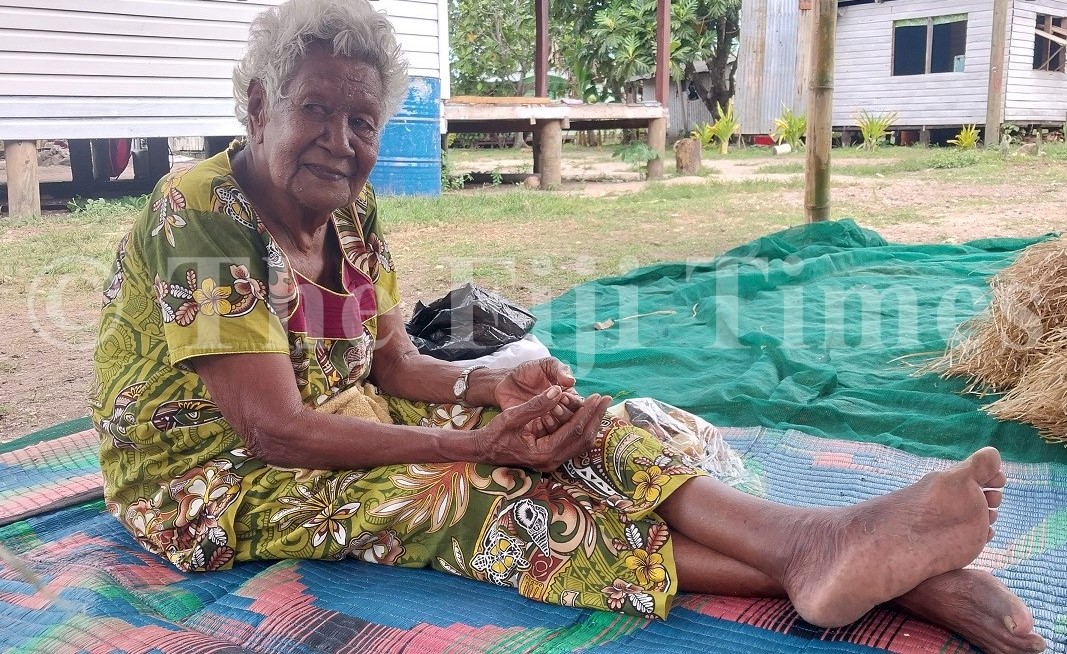While washing pots out at sea on a hot sunny day in the 1960s, Melania Disea claims she saw a centaur standing in the village lawn looking at the surrounding houses.
Although she froze in fear in the first instance, Melania knew she had to do something to prevent any possible casualties.
So she yelled out to the women in the village to keep their children inside their houses.
This happened during her young days about 60 years ago at Nabubu Village in the district of Namuka in Macuata where this centaur, ‘diratarata’ is known to be the ancestral custodian of a nearby village.
She is now 86 years old and is the clan leader of her traditional yavusa Naduru of Nabuna Village in the district of Dogotuki.
Her mother is from Nabubu Village in the district of Namuka where she was brought up and where The Fiji Times team caught up with her.
Recalling that day, Melania said : “I looked back to the village lawn while washing pots out at sea then I saw diratarata standing there looking around and then he stared at me.”
“I got scared because I have always heard about this vu (ancestral tribal god), but never saw it and that was the very first time I saw and the most scariest part is that it was looking right at me.
“Somehow, I had to gather the courage to call out to the women to keep their children inside their homes because of this creature.”
But when she got to the village compound, villagers asked why she was yelling as nothing had happened and everyone thought she had gone insane.
“I told them what I saw, but no one else saw it and I got scared because I have only heard of the stories of this centaur from our village elders. But that was the last time I saw it,” Ms Melania said.
“I saw it head down the village coast and it disappeared and I was the only one who saw it.
“When I returned home, I shared to my mum what I had seen and she with other elders told me that it was that vu from Qelewara, a nearby village.”
Another great man she spoke about was Radaiga, known for his victorious battles wherever he travelled.
According to Melania, this was the same person who travelled to Taveuni to support the Tui Cakau in his war against the Tongans led by Wainiqolo.
“They won this war with others who travelled from Dogotuki and he also went to Labasa to help the Tui Labasa with his tribal war and as a way of appreciating his contribution, the chief gave him a piece of land in Labasa.
“For his help in Taveuni, he returned home and since then there has been a special relationship between the people of Taveuni and Namuka.”
Sharing her memories of Namuka district, Melania said houses of that time were basically tin sheds that used pandanus leaves and tarpaulins. With no water supply, electricity or modern touches, Melania, said they used lanterns or candles for light at night.
“Otherwise, some families didn’t use any lanterns because income wasn’t as easy to get in those day so they couldn’t buy,” she said.
“There were no roads those days. The sea was our way around here by punt or small boats but no engines.
“We had to row the boats and if we wanted to travel to Labasa, we had to leave the village in the evening, row our boats towards Lagalaga which took us about four hours.
“When we get to Lagalagala area, we will look for a cave where we can spend the night to wait for the early morning bus at 5am.
“Life wasn’t easy those days. Today, that same distance we followed at sea is less than an hour by speedboat so the generation today is very blessed.”
The main source of income, she said, was seafood.
“The Chinese family from Silivakatini, a settlement that sits along the coast of Dogotuki, used to buy all our products whether it’s fish, seaweed or seashells.
“That was our major source of income here apart from planting root crops.
“We never received much because of the value of cash those days so our fathers used to plant a lot of food and we ate fresh food all the time.”
This is the very reason they never got sick in her days, she added.
“Another reason why I have lived until 86 years old. It’s all because of the food we ate in our young days which were all healthy food.
“I feel sorry for the generation today. The quality of life we lived in our days with our parents is not the same as today.”



